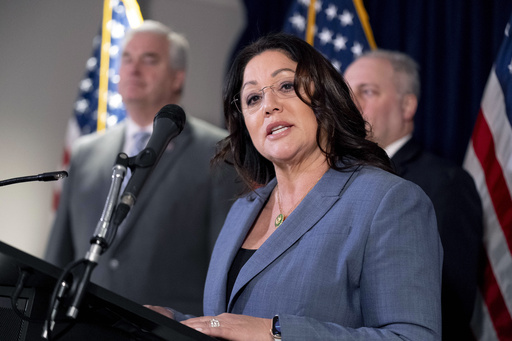PORTLAND, Ore. — The Pacific Northwest is emerging as a critical battleground in the race for Congress, with two of the nation’s most competitive U.S. House contests unfolding in Oregon and Washington. The GOP-controlled 5th Congressional District in Oregon and the Democratic-held 3rd Congressional District in Washington are both seen as toss-up races, where either party might clinch victory.
Both districts are politically mixed, characterized by a blend of Republican and Democratic inclinations. They feature first-term incumbents who achieved narrow victories in the 2022 midterm elections. Political analysts believe that turnout will be pivotal in these races, particularly as presidential elections typically drive higher voter engagement compared to midterm cycles, which could influence the mobilization of moderate and independent voters.
“Those districts are essential in determining which party will control the House in the coming Congress,” says an assistant professor of political science from the University of Oregon. “The action is definitely concentrated here in the Pacific Northwest.”
**Washington’s 3rd Congressional District**
In southwest Washington, a highly anticipated rematch unfolds as Democrat Marie Gluesenkamp Perez defends her seat against Republican Joe Kent, who has received backing from former President Trump. Both candidates are attempting to position the other as the more extreme option.
This district, with its mix of farmlands and suburbs adjoining Portland, narrowly supported Trump in the 2020 election, making it a significant target for Republican efforts this year. Gluesenkamp Perez presents herself as a moderate with an independent streak, highlighting her bipartisan efforts, such as co-sponsoring legislation to safeguard abortion medication and voting against certain stances taken by Vice President Kamala Harris on border issues. Her bipartisan voting record has garnered favorable evaluations from political watchdog organizations.
In terms of fundraising, Gluesenkamp Perez has significantly outpaced Kent, with $6.7 million raised compared to his $1.4 million, based on the latest quarterly federal campaign finance data.
Kent, a former Green Beret who has perpetuated Trump’s claims about the 2020 election, has criticized the Biden administration’s policies, particularly regarding immigration and inflation. While he has softened some of his past rhetoric on abortion, stating in a recent debate that he does not support a federal ban, Gluesenkamp Perez asserts that his current positions do not reflect his true beliefs, suggesting they are merely what pollsters advise him to say.
Both candidates have emphasized their concern for struggling economy, particularly in the rural parts of the region. According to a political science expert at Washington State University Vancouver, both are trying to convince voters that they genuinely care more about the economic vitality of rural communities in Southwest Washington.
Having achieved a surprise victory in 2022 against Kent, Gluesenkamp Perez took a district that had been predominantly Republican for over a decade. She succeeded Jaime Herrera Beutler, a moderate Republican who had lost the previous GOP primary, partially due to her impeachment vote against Trump following the events of January 6.
While precise party registration isn’t in place for state elections, figures from the presidential primary this past March revealed that Republicans had a lead of nearly 30,000 voters over Democrats in the district. However, officials have indicated that such numbers don’t definitively predict the election outcome.
**Oregon’s 5th Congressional District**
Following the 2020 census, Oregon’s 5th Congressional District saw significant redistricting, encompassing a diverse mix of Portland’s urban landscapes, affluent suburbs, rural agricultural lands, and the burgeoning city of Bend in Central Oregon. In the 2022 elections—the first since the boundary changes—Republican Lori Chavez-DeRemer flipped a seat that had been held by Democrats for approximately 25 years. This November, she will face Janelle Bynum, a state representative with strong support and financial backing from national Democrats.
Bynum, who made her way to the Oregon House back in 2016 and represents the suburbs southeast of Portland, has pledged to work toward codifying abortion rights into federal law, following the reversal of Roe v. Wade. Before her congressional run, Chavez-DeRemer served as the mayor of Happy Valley and is a small business owner. Although she has endorsed Trump, she asserts her opposition to a national abortion ban, despite previously supporting the Supreme Court decision that dismantled federal abortion rights.
If elected, Bynum would make history as Oregon’s first Black Congress member. Chavez-DeRemer, on the other hand, became the first Latina member of Congress representing Oregon, alongside Andrea Salinas, who was elected in a separate district during the 2022 midterms.
In the 5th District, Democrats hold a modest advantage in voter registration, but nearly one-third of voters remain unaffiliated. Both candidates are striving to appeal to the district’s politically diverse electorate, with Bynum branding herself as a pragmatic leader and Chavez-DeRemer emphasizing her bipartisan accomplishments. They both aim to depict each other as extreme within the political spectrum.
In fundraising efforts, Chavez-DeRemer surpassed Bynum with approximately $4 million raised compared to Bynum’s $2.4 million, as per the latest finance records. Both parties have been proactive, each reserving over $6 million in advertising within the Portland media market, which overlaps with portions of both districts.


